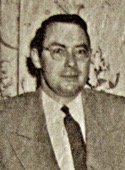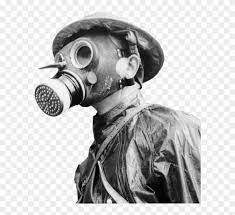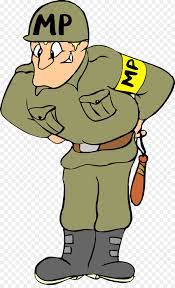Uncle Bill and World War II - Normandy
Editor's Note: When you see these three dots surrounded by a gray rectangle — 1 — you can click on it to get further information about the topic. Click a second time, and the message goes away.

NOTE: My mother's brother, my Uncle Bill, participated in many of the major battles of the European theatre during World War II. This page and others reveal his experiences. For a full listing, see the bottom of this page. The photo at left is one of the rare photos I have of my uncle. It was taken after the war.
Before Normandy
Bill was not at Normandy on the day of the landing — June 6th — but he was there the next day. His memories are more about the time he spent in England before the battles began. His group goes ahead of him while he remains behind with just a few. But, like all Americans, he went to England first to wait for the invasion of Europe.
“Before leaving England all troops went through the “sausage.” These were barbed wire enclosed camps designed to keep the … invasion troops 'in.' It was here where all vehicles were re-checked to make sure they had been waterproofed. [Since] all vehicles would be going off LSTs [landing ship tanks].… they had extensions on their exhausts so they could travel through water and had been waterproofed as much as possible."
And my uncle added:
“The food was good…mostly steaks."
And then there was the anti-gas clothing

Gas had been used in World War I, so there was a fear it would be used again, but the Western Allies did not use chemical weapons during the war....[However] General Alan Brooke, Commander-in-Chief, Home Forces, in command of British anti-invasion preparations of the Second World War said that he "...had every intention of using sprayed mustard gas on the beaches" in an annotation in his diary.The British manufactured mustard, chlorine, lewisite, phosgene and Paris Green and stored them at airfields and depots for use on the beaches.2
Since no one knew if gas would be used, it was necessary to prepare:
“One of the big things was getting anti-gas clothing. This was like long underwear. It covered everything from the ankles to the neck. And it itched. And it smelled. But everyone wore it. I often think of those poor infantrymen who wore that gas clothing on D-Day. It was hot, too. Also, as you waited in the sausage you “gas proofed” your shoes. This was a paste you spent hours rubbing on your shoes, into the cracks, into the soles.”3
The Last Man

Bill and his group watched everyone leave, and then he went for strawberry shortcake.
“Funny, but one thing I think most about [on D-Day anniversaries] is getting a big juicy strawberry shortcake with lots of whipped cream from the local tea shop. Our camp was right beside a residential area and a block down the street was a tea shop in one room of a house. Two elderly sisters ran the tea shop. One or two of us would go over there two or three times a week to get tea and cookies.
“Our main group went out on D-Day. All the guns, the trucks with ammo and gasoline, the smaller trucks that laid wire, etc. About twenty-five of us were in the reserve party…that included the personnel section…so as soon as the main party was gone two or three of us went to the tea shop. The ladies were waiting for us with … free strawberry shortcake. It was delicious. It was a special occasion."
Oops! Did we get forgotten?
“Also, as soon as the main group left, Major Stewart left for London. He had a girlfriend there, a nurse in a tent hospital just outside London. I always rode with Major Stewart so he gave me maps, telephone numbers, complete instructions. He was going to London for one night. He’d be back by mid-morning, but DO NOT LEAVE ME, he’d say. Stall, stall, stall, take your time if the reserve group gets its call.
“Well, Major Stewart got back and we didn’t get our call yet so he decided to go back again. He left in the late afternoon and said he’d be back by mid-morning again. This went on for a week, then another week.
“…he decided he should go to First Army Headquarters and find out when we [should] go. We drove [there] and located the two quonset huts where shipping orders were listed. I was to go in and … find a friendly sergeant and ask him when the 981st reserve unit would go.

“I found a friendly sergeant. He went to a file of wall boxes, took out a card, came back to me and asked what group we were with.… Then he went over to a Lieutenant and had a conversation. Then they got a group together with a major. Then [suddenly] I realized two big burly MPs were by my side.
“The major and captain came over and said, “Sergeant, are you AWOL?…the reserve for the 981st moved out three days after the main group. Where have you been?
“I convinced them that Major Stewart was in the Officers’ Mess and that his command car and driver were outside, [but] they thought all three of us were AWOL. It all ended up with two MP jeeps escorting us back to camp and finding the entire reserve there. We went the next morning.
“I guess we could have stayed in England a few weeks longer, might even have gotten more shortcake. All the boys in the main force thought we’d gone down at sea because all of us were missing. Well, in a few days I changed from eating strawberry shortcake to drinking … cognac.”
Here are the other battles that Bill experienced:
- The Battle of Cherbourg June 18, 1944
- Battle of the Hedgerows and Battle of Saint Lo July 7-19, 1944
- Battle of the Falaise Pocket August 11-21, 1944
- Battle of the Hurtgen Forest September 19 - December 6, 1944
- The Fall of Aachen October 2-21, 1944
- Battle of the Bulge December 15, 1944 - January 25, 1945
Or return to Main Page to check out other battles, other stories.